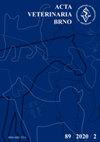兔股骨滑车缺损软骨和骨软骨再生模型的建立
IF 0.7
4区 农林科学
Q3 VETERINARY SCIENCES
引用次数: 1
摘要
关节软骨退变是骨关节炎的主要特征之一。近年来,基于生物材料的新方法已成功应用于骨软骨再生。我们的研究是在兔子身上进行的,以评估关节软骨损伤模型,以测试骨软骨再生的生物材料。我们在15只白种雄性新西兰兔股骨滑车沟区表面制造骨软骨缺损,大小为3mm × 3mm(直径×深度)。术后2周、4周、6周对家兔进行监测并采集标本。根据国际软骨修复学会(ICRS)分级和x线片对缺损重建进行宏观评估。显微镜下评价采用红木精-伊红染色和红花素O染色。缺损采用再生组织修复,2周、4周、6周后恢复效果逐渐提高,从微观和宏观上均可见。然而,再生组织主要是纤维结缔组织,而不是软骨或骨。这是一个关节软骨损伤模型,适用于使用生物材料进行骨软骨再生相关临床前研究的早期筛选。本文章由计算机程序翻译,如有差异,请以英文原文为准。
A rabbit femoral trochlear defect model for chondral and osteochondral regeneration
Articular cartilage degeneration represents one of the main features of osteoarthritis. Recently, novel approaches based on biomaterials have been successfully applied to osteochondral regeneration. Our study was carried out on rabbits to assess a model of articular cartilage damage to test biomaterials for osteochondral regeneration. We created osteochondral defects on the surface of the trochlear groove area of the femurs in 15 white male New Zealand rabbits of the size of 3 mm × 3 mm (diameter × depth). Rabbits were then monitored and samples were collected 2 weeks, 4 weeks, and 6 weeks after the operation. The reconstruction of defects was assessed macroscopically according to the International Cartilage Repair Society (ICRS) scale and radiography (X-ray). For microscopic evaluation, haematoxylin-eosin staining and safranin O staining were used. The defects were repaired by regenerative tissue, and the recovery results gradually increased after 2 weeks, 4 weeks, and 6 weeks, showing both microscopically and macroscopically. However, the regenerative tissue was mainly fibrous connective tissue, not cartilage or bone. This is a model of articular cartilage damage that is suitable for early screening of preclinical studies related to osteochondral regeneration using biomaterials.
求助全文
通过发布文献求助,成功后即可免费获取论文全文。
去求助
来源期刊

Acta Veterinaria Brno
农林科学-兽医学
CiteScore
1.00
自引率
33.30%
发文量
36
审稿时长
18-36 weeks
期刊介绍:
ACTA VETERINARIA BRNO is a scientific journal of the University of Veterinary and Pharmaceutical Sciences in Brno, Czech Republic.
The scientific journal Acta Veterinaria Brno is dedicated to the publication of original research findings and clinical observations in veterinary and biomedical sciences. Original scientific research articles reporting new and substantial contribution to veterinary science and original methods that have not been submitted for publication elsewhere are considered for publication. A written statement to this effect should accompany the manuscript, along with approval for publication by the author´s head of department. The authors bear full responsibility for the contents of their contribution. Book reviews are published, too.
 求助内容:
求助内容: 应助结果提醒方式:
应助结果提醒方式:


